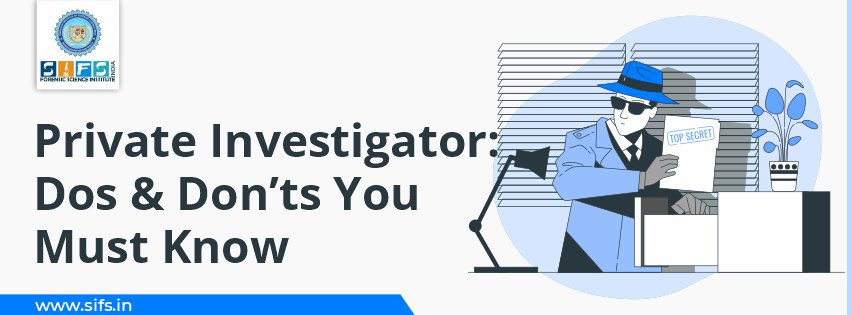- Call Us: +91 7303913002
- Email Us: education@sifs.in
Private Investigator | Dos & Don’ts You Must Know

BY SIFS India | May 11, 2022
Private Investigator | Dos & Don’ts You Must Know
A private investigator is a rewarding and exciting career option for candidates having excellent observation and detecting abilities. After getting trained, you can start your investigating agency.
Your job involves collecting evidence to help solve crimes, thereby providing justice to the innocent by getting the criminal convicted.
Before you begin your journey to become a private investigator, a few questions pop up quite frequently.
Though private investigators’ work is similar to law enforcement and detectives, some questions confuse people about what a private investigator can do and cannot do legally.
Q. What is the Role of a Private Investigator?
A. You can take up as many projects as you like, and your primary objective is to collect evidence. You can be hired by companies, organizations, individuals, etc., for several purposes.
The primary role is to collect valuable information for the clients as per the case.
A few of the reasons for hiring you are:
• To investigate court case facts
• To investigate frauds within the company
• To find a missing person
• To probe workplace issues
• To conduct surveillance
• To conduct background checks
• To interview people
• To collect personal and financial data
• To run vehicle or property fire examination
• To do fire debris analysis
• To do an electrical fire investigation
• To conduct an insurance fraud investigation
Please note that every state has its rules specified for private investigations. You must follow all the rules and keep yourself updated about new government policies to carry out business activities, and else you might be barred from carrying out investigation work.
Q. Can You Interrogate?
A. No. You cannot interrogate, and can only indulge involuntary confessions of the guilty. Only law enforcement has been imparted constitutional rights to carry out interrogations. They have the right to interrogate suspects by taking them into their custody though they have to give notice to the person before interrogating.
Q. What is The Difference Between an Interview and an Interrogation?
A. Both are similar but differ in their approach and outcome. Both are conducted with the primary aim of gathering information.
Interview: It is an informal process between two or more persons or parties and is non-accusatory. Also, the person you interview does not need to be a suspect, and he can be a witness or anyone who possesses information relevant to the case and help in concluding.
Interrogation: It is the formal process of systematically questioning a person to extract as much information as possible about the crime. The person being interviewed is the suspect, and it follows a direct approach and is accusatory.
Q. Can You Make Arrests?
A. Only police officers have the power to make arrests, and you as a private investigator cannot make arrests even if you are a witness to a crime. The police use the information collected by you, which might lead to arrest.
Even if the authorities allow you to make an arrest, you should have complete knowledge of the law and adhere to it.
Q. Can You Trespass?
A. Though investigators are allowed to go anywhere publically, you cannot gain unauthorized access to any device, property, storage area, cabinets, or building without permission.
Q. Are You Allowed to Hack Private Online Accounts of People?
A. You cannot access any person's personal accounts, devices, or information. You can only carry out the investigative process by accessing public information like social media profiles, information on websites, public databases, or public directories.
Q. Can You Wear a Badge or Uniform or Act as a Law Enforcement Official?
A. No. You cannot wear a uniform, carry a badge, or imitate a police officer or any other law enforcement official as it is a crime. However, if you are allowed to do so, you cannot misuse its power or act as a law enforcement official.
Q. Can You Spy on People?
A. You must understand the local, state, and central privacy laws. You cannot stalk people at home, in private places, clicking their pictures at night, etc. If you are caught violating these laws, you might get stuck in legal trouble.
While photographing or recording people publically, you must be cautious and follow all the laws strictly.
Do You Want to Become a Private Investigator?
You must have got a glimpse of the dos and don’ts while working as a private investigator. Hence, you must understand what investigating techniques can be a part of your investigation process.
The first step is to get trained if you want to explore more about this ever-growing field and what best practices you can indulge in. And if you are serious about this career, you can look at the industry-oriented certificate and diploma programs offered by India’s award-winning renowned private forensic science laboratory and training provider SIFS India.

